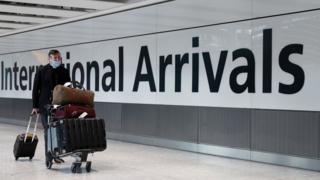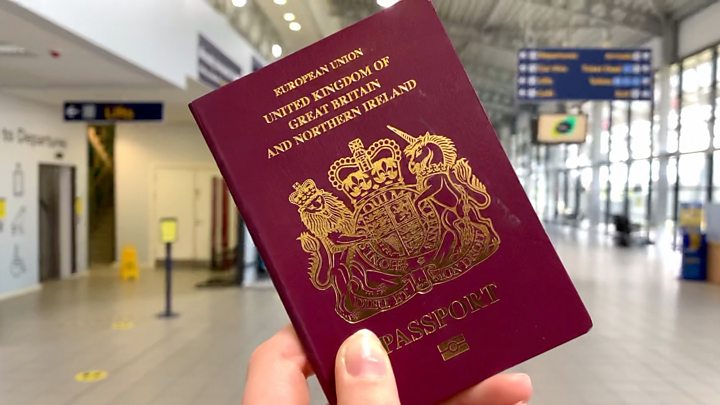 Image copyright
AFP
Image copyright
AFP
Travellers arriving in the UK from dozens of countries no longer have to self-isolate for two weeks from Friday.
The rules are being relaxed for arrivals from more than 60 countries and British overseas territories.
However, Scotland's list of countries is slightly different to the list for England, Wales and Northern Ireland, since Scotland still requires people from Spain to quarantine.
Foreign Office advice against taking a cruise holiday remains in place.
From Friday morning, people arriving in the UK from France, Italy, Belgium, Germany and dozens of other countries will no longer have to spend 14 days in quarantine .
But people who arrived from those countries at an earlier point in the last two weeks will still be expected to complete their period of isolation.
Serbia had been on the list for England, Wales and Northern Ireland but was taken off on Friday, based on the latest assessment of coronavirus risk.

Media playback is unsupported on your device
Scotland, which from Friday has also made face coverings mandatory in shops, has chosen a different list of exemptions featuring 57 countries and 14 UK overseas territories.
It said it will continue to quarantine passengers from countries with a higher prevalence of Covid-19 than its own.
Its list means people arriving in Scotland from Spain will still face quarantine rules. The Scottish government said data from the UK government shows the prevalence of the virus in Spain is 330 people per 100,000, compared with 28 people per 100,000 in Scotland.
First Minister Nicola Sturgeon said the "difficult decision" was necessary to protect Scotland from a resurgence of the virus and warned travellers not to try and bypass the restrictions by flying to airports in England.
The quarantine rules were introduced in June, with travellers asked to nominate an address where they would self-isolate, with fines of up to £1,000 for those who failed to comply.
Image copyright AFP Image caption Some of the UK's most popular tourist destinations, such as Majorca in Spain, are exempt from quarantineAmong those setting off on holiday on Friday was Billy Marigold, who is flying with his family to Geneva from Gatwick Airport to celebrate his 60th birthday.
"It was only last week we made a decision," he told BBC Breakfast.
"Even last week we were talking about whether we can go or not, because none of us can self-isolate for two weeks when we come back. And we were so worried about self-isolating on the other side as well."
Image caption Mr Marigold and his daughter are flying out to see his son in GenevaAs some international travel to and from the UK is opened up, the Foreign Office is continuing to warn against journeys on cruise ships, however.
Warnings against cruise ship travel were first issued for over-70s in March before the Foreign Office began advising against all but essential travel.
A spokesman said the decision not to change the advice against cruises is based on "medical advice from Public Health England", but it would "continue to review" the position.
Carnival, the world's largest cruise company which owns P&O and Cunard, said it had already put its voyages on hold until the autumn and would not resume them until "rigorous protocols" were agreed with government and put in place.
Meanwhile the World Health Organization has warned that "in most of the world the virus is not under control" and the pandemic is "getting worse".
Dr Tedros Adhanom Ghebreyesus, the WHO's director-general, said: "The pandemic is still accelerating. The total number of cases has doubled in the last six weeks."
He said countries have now reported more than 11.8m cases of Covid-19 and 544,000 deaths.
But with infections in the UK falling, the government and devolved administrations continue to ease coronavirus restrictions.
In England, grassroots sport will start to return from this weekend, while beauty salons can reopen on 13 July and indoor gyms and swimming pools on 25 July.
Open-air concerts and theatre performances are also allowed to take place from this weekend in England, as long as they have a "a limited and socially distanced audience".
Children's playgrounds and community centres in Wales will be able to reopen from 20 July.
And Northern Ireland has brought forward changes to lockdown restrictions, allowing indoor fitness studios and gyms to reopen on Friday, along with bingo halls, amusement arcades and cinemas.
Indoor weddings and baptisms can also resume, ministers decided.
Scotland has begun to allow people to visit each other indoors and to allow overnight stays, as well as setting dates for reopening bars and restaurants, hairdressers and barbers, and the tourist industry.
How have your travel plans been affected? Please share your experiences with haveyoursay@bbc.co.uk.
Please include a contact number if you are willing to speak to a BBC journalist. You can also contact us in the following ways:

 5 years ago
565
5 years ago
565 

